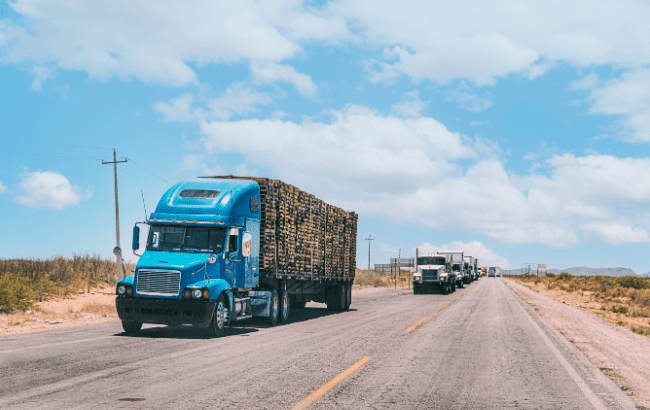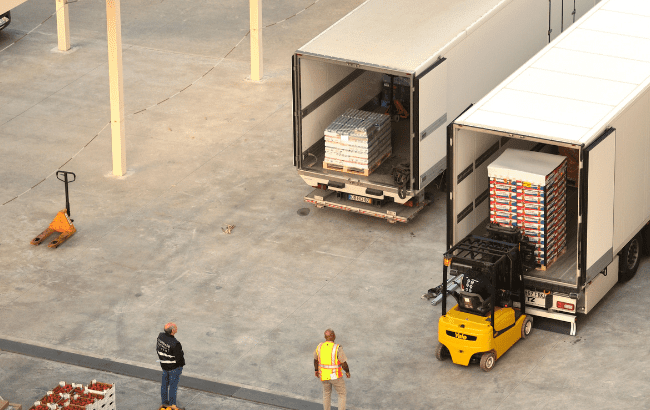Uncovering the murky world of spirits freight theft
Two trucks carrying cases of Santo Tequila disappeared at the US-Mexico border, highlighting the illicit world of freight fraud.

In November 2024, Santo Tequila founders Guy Fieri and Sammy Hagar were dealt a shocking blow when they discovered two trucks carrying 24,240 bottles had disappeared in Laredo, Texas. Fieri likened it to something out of a movie, but the reality was that Santo lost US$1 million in product, including 40 cases of its rare extra añejo single barrel expression.
Freight crimes such as these are often coordinated attacks, with criminal organisations posing as legitimate trucking companies. Authorities believe the two Santo Trucks were lifted with decoy GPS tracking and an illegal practice known as double brokering, in which the company that wins the cargo load sells the work order to someone else.
“Consumer goods, including spirits, including Tequila, are very easy to offload,” Santo CEO Dan Butkus says. “These are organised crime syndicates that have a distribution network in place. We’re not the first Tequila company that’s happened to, we’re just the first that has publicised it.”
According to a recent report by supply‐chain risk management firm Overhaul, food and drinks account for 11% of cargo thefts in the US, making it the fourth‐largest category. In the third quarter of 2024, Overhaul recorded 500 cargo thefts in the country, up by 6.2% on the previous quarter. This type of theft typically increases around the Christmas holiday season, but has been on the rise since the pandemic spawned supply‐chain issues that criminals could exploit.
Forged documents
Danny Ramon is the director of intelligence and LE connect at Overhaul, and is from Laredo. He warns it is becoming easier than ever for criminals to forge documents and give the appearance of being legitimate. He also predicts further thefts in cities like El Paso in Texas and Laredo, where products can be moved across the Mexican border and liquidated quickly.
“A lot of these fraudulent carriers and brokers operate legitimately within the supply chain,” Ramon says. “They have been for years, and they will slowly burn these carrier or broker identities as they churn through different shippers.”
Even when best practices are carried out, when documentation is examined at every checkpoint, and tracking is closely monitored, catching and prosecuting the criminals can be challenging, especially when the fraudulent companies vanish overnight, along with the freight.
“Quite often, unless you can prove that there’s intent to steal or a pattern of behaviour of theft and fraud behind it, even if you catch it in the act, it’s very hard to get law enforcement to act on it because they’re going to look at it as a civil matter,” Ramon says. “This is a contract dispute.”
Chris Burroughs, president and CEO of Transportation Intermediaries Association, agrees that law enforcement needs to improve the way it handles these cases.
“It’s a massive problem, costing US$1 billion, roughly, to the supply chain,” Burroughs says. “The Federal Motor Carrier Safety Administration, quite frankly, has dropped the ball on enforcing this. There’s never been one enforcement action against a fraudulent carrier or fraudulent broker.”
Burroughs says that freight fraud will only increase until enforcement cracks down on it, and that criminals have the upper hand when organising these plots. “We’ve got to be right 100% of the time with everything that we’re doing,” he says. “For them, it’s just one time they [have to be] right.”

Education remains a significant issue in preventing freight fraud, as these cases frequently go unreported, either out of embarrassment or to protect stakeholder interests. “We have seen other Tequilas being stolen. Bourbons are particularly popular because they command extremely high prices in certain overseas markets,” Ramon said.
Preventing freight theft starts by understanding that the threat is real, and that there are measures and technologies in place for brands to protect themselves.
“There are dozens of red flags, and there’s really no one red flag to look out for,” Ramon says. “The big piece, especially for fraudulent theft, is visibility. You need to be able to know what’s happening with your shipment to detect a pattern of theft while you still have an opportunity to recover it.”
Ramon references live compliant monitoring as one measure, while GenLogs and other technology companies offer services to protect and recover vulnerable shipments. If a load goes missing, GenLogs assist in locating it at no cost.
“Ideally a theft never occurs in the first place, and GenLogs gets ahead of that by offering unparalleled visibility into the movement of commercial vehicles on major freight lanes,” says Blake Balch, co‐founder and chief of strategy and partnerships. “This helps freight brokers and shippers connect directly with legitimate carriers without rolling the dice on fraud‐laden load boards.”
Tighter measures
Santo worked with CargoNet following the theft, and Butkus says the brand has begun to take tighter measures to ensure Johanson Transportation Services, who it uses to book its freight shipments, is working with legitimate companies, starting by vetting the winning carriers themselves.
“We are talking with other Tequila companies who have had this happen, to try to sit down in the new year and take a look at it collectively because it’s an industry problem at this point,” Butkus says. “It’s bigger than the public realises.”
GenLogs recommends businesses use secure platforms or third‐party verification services to authenticate carrier identities, take common sense security steps wherever possible, communicate with drivers and dispatchers frequently, and be vigilant about anomalies such as last‐minute carrier changes or irregular documentation.
“I always find it surprising, talking to C-suite folks, who say: ‘You’ve got to spend money to make money.’ But when it comes to security, they seem very reluctant,” Ramon says. “And it’s so much more than just the cost of the lost product. You have missing product on shelves, loss of market share, potential brand damage, reputational damage, your vendor‐ relationship damage, and then insurance costs rising. Then you’re going to have to up your security anyway.”
Related news
Sid Vicious bar to open in Washington state
